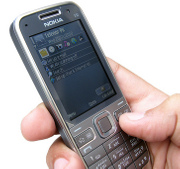
Pakistan (MNN) — For Pakistani Christians who name the name
of Christ using their cell phone, there's a new hurdle.
Voice of the Martyrs spokesman Todd Nettleton explains: "The
story begins with a letter from the telecommunications authority in Pakistan.
They have sent a letter to the cell phone companies with a long list of
words–about 1500 of them. [The letter says:] 'If these words are in a text
message, then you need to block that text message.'"
According to government authorities, the order was an
attempt to block spam messages in both English and Urdu. Nettleton acknowledges that "a lot of the words are obscenities, or
sexual words," and their
place on the block list was obvious.
But, he says, "One of the
terms that they've marked for blocking is 'Jesus Christ' — the name of our
Savior. It's interesting to see that listed in a list of words that they want
to have blocked."
The reasons for blocking the name "Jesus Christ" were less clear,
raising questions about religious freedom and practicality. "It presents the idea that Christians can
be singled out through their cell phones, through their text messages. In a
country like Pakistan where it's legal to be a Christian–except if you were a
Muslim and now you're an apostate and following Christ, does this mean that
the government is looking at people's text messages and trying to single out
who are Christians and who aren't?"
Nettleton goes on to explain, "They are allowed under a 1996 law to
prevent people from sending information that's false, fabricated, indecent or
obscene." Any word could
conceivably be part of a spam message, but it's the next phrase defining what
is "false, fabricated, indecent or obscene" that raises red flags. "They
go on to say they have the right to restrict free speech 'in the interest of
the glory of Islam.'"
Due to the difficulties presented by Pakistan's blasphemy law, believers have been careful about how they
handle Gospel work. Nettleton says they
have also gotten creative with their use of the technologies available. "There are
ministries that are sending Scripture text messages; they're sending
evangelistic text messages. In some cases, they're literally sending videos
from phone-to-phone to present the Gospel."
Cell phone companies had seven days to implement the order, which went into
effect on November 21. Ministries had
less time to react. For some, outreach
will be compromised. "It seems like
that would single out Christians who are doing ministry, who are doing
evangelism, who are doing anything that would be seen as not 'in the interest of the glory of Islam.'"
Could this move be a precursor to Hate Speech/literature action
that criminalizes following Christ? Similar moves have already been made in Australia, Sweden, Canada, and
to a lesser extent–the United States.
Nettleton responds, "I don't
know if this is likely to cause more issues, or if this is pretty much an
example of the issues that already exist there. The church faces an uphill
battle to be recognized, to be protected by the government."
Islamists have the influence to sway government
response. Last year, the government temporarily
banned Facebook because of material on the site deemed offensive to Islam. Pakistan
has also blocked pornographic Web sites and ones deemed anti-Islamic. However, the definition of what is "anti-Islamic" is very loose, which leads Nettleton to add, "Pray for the
safety of the Christians who are working and witnessing in Pakistan."
